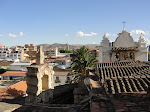Hello All!
Well it’s now exactly two weeks before I depart for Bolivia, and I’m definitely getting very excited. For the last few weeks I’ve been trying to dot all the I’s and cross the T’s, and I think I’ve gotten things pretty well straightened out. I’d like to say thanks again to everyone who has supported me as I prepared for this trip – I owe this opportunity to many, and this is just a small way for me to try to share my experience with you all.
I’ve been reading my pre-immersion materials, which include a number of articles and the book The Open Veins of Latin America, which was written by Eduardo Galeano, and gives a rather extreme view (a native view) of the history of Latin America since the beginning of colonialism. It’s rather difficult to read, actually, because it's at times very upsetting, but anyway the point of telling you all this is just to say that I wrote this as sort of a response to that book.
We have journal entry assignments for my classes there, so this entry is taken from the first assignment…
“What are your expectations, assumptions, and fears relating to your upcoming cultural immersion and travels?”
When I first considered this question, I looked back briefly to my previous experiences in South America (having already spent 10.5 months in Brazil, a few days in Chile, and a few weeks in Peru). As such, I expect to feel that internal thrill of entering the unknown when the plane first touches down in Lima, momentarily unhindered by the exhaustion that quickly overtakes even the most experienced travelers.
Beyond that, I expect to be greeted once more by the fresh air and breathtaking vistas that are South America, and which house structures and faces characterized by an odd juxtaposition of ancient wisdom and simplicity and religious propaganda and overzealous architecture, still ancient in its own right.
I assume that all of us taking part in this great journey will become good, if not great friends through our shared interests and experiences. I assume the courses will be stimulating and insightful, and that the service element will both fill our hearts with joy and shatter them to bits. I also assume that there'll be lots of fun local market shopping :-), one of my favorite overseas-activities.
I also have fears, of course. I have fear about my host family, as I’ve had some negative experience in this area in the past; I won’t meet this one until I arrive, but I’m hopeful that we’ll get along just fine. I also have fear that I’ll arrive all excited only to find myself the outsider of the group, but from everyone’s getting-to-know-you e-mail they seem very cool. And, juvenile as it may seem, I also fear the remoteness when it comes to a lack of communication and technology (it is a city so there will be internet café’s - that’s good). This stems mainly from the prospect of not being able to see my boyfriend or maybe even hear his voice for 3 months when I usually text him about every 5 minutes, and also from the fact that Im expecting another sibling at the beginning of December.
Above all, though, I think my greatest initial fear when considering this program was the prospect of having to once again go through the reverse culture shock of coming home, and, for me, what has in the past turned into a post-exchange depression. This trip will be much shorter, it’s true, but its nature, I believe, will make it much more difficult to walk away from.
I believe this because the service portion of the trip will be, while certainly very rewarding, very challenging for me. Looking poverty in the face – really giving it a face, and a name, or 30 names, or 100 names of people I meet and interact with will, I’m sure, change the way I see many things I have come to take for granted. Of course, a general passion for and interest in the region, language, and its people have driven me here in the first place, but after reading a few pages of Galeano’s book I have to question the validity of that drive. So many people who do service are really just self-serving, thinking of college applications and image, and I truly hope to not be one of those people.
I’m thinking now of my trip to Peru in March/April, 2008. I remember being awed by the picturesque landscapes, ad struck by the reality of its inhabitants’ lives: truly living to survive. Still, I’m now ashamed to admit feeling indignant when a little girl bugged me for a coin after I took one of those pretentious tourist photos of her, decked out in traditional garb, holding a baby goat in her arms and staring up at us with her dark, seemingly empty eyes. I wonder now what she would’ve told me had I instead thought to ask her name (if I’d even been able to with the language barrier), and who her family was, and whether she liked whoring herself to Western tourists’ LCD-stares, rather than going to school. I wonder if she knew that my camera quite possibly costs as much as her family lives on in a month.
We snap the photo and we think we understand what’s behind those eyes. We drive by the huts and think we begin to feel what it’s like to only consume that which you truly produce, and which your life depends on, reaped solely through your own sweat and calloused hands. And we imagine we can stand there with them and look back at ourselves with awe and resentment.
Perhaps this time around I’ll ask.
I don’t mean to say that these people have no happiness, no hope, or no future, or that they even envy the “developed world” for its material wealth, based on principle. I just mean that once you begin to think you understand something, you then realize days, or weeks, or months later that you are in fact as hopelessly ignorant as ever; perhaps as ignorant, indeed, as the conquistador believed the poor Indians to be not so long ago. If not ignorant, then we are (or at least most are) terribly naïve.
So, as I prepare to make this journey at last, I plan to set out with an attitude of complete humility. I hope to learn from these people all that they have to, often unknowingly, teach me about themselves and their culture as it exists today. I expect that I will leave Bolivia more conflicted and perplexed about the state of the world than I am while entering it, but I hope to have at least some sense of clarity.
I expect the unexpected, and I fear the unknown; however, I also embrace the opportunity to use that fear as a tool to become a more perceptive student – both in the classroom and in the wide world. In essence, I hope, or expect, or assume, or fear, that I will learn what it means to be a true “global citizen”, and, perhaps, even take some baby steps in that direction.
Yours,
Alanna
P.S. I've decided to from now on share a link to a song that I have stuck in my head or thinks pertains to the post. This is mainly just because I'm a music snob :-P
Today's is "Flume" by Bon Iver
http://www.youtube.com/watch?v=K7-zmQ3XEc0
Wednesday, August 26, 2009
Subscribe to:
Comments (Atom)

